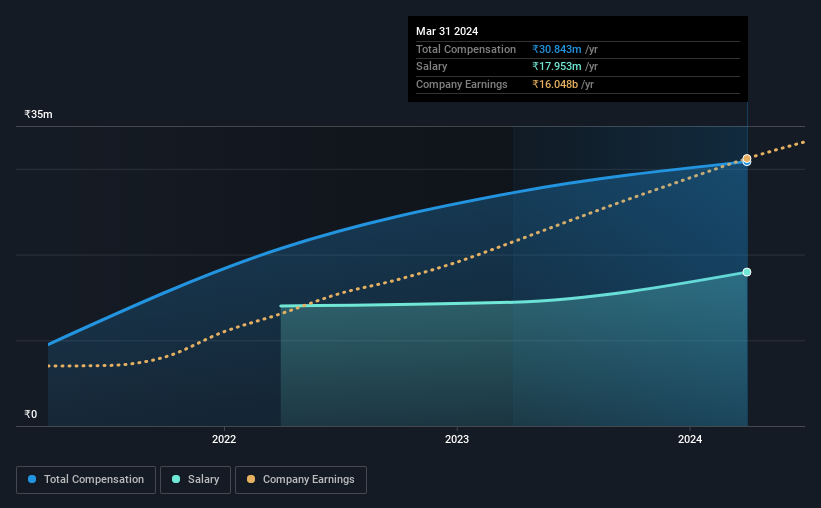We Think Shareholders Will Probably Be Generous With The Karur Vysya Bank Limited's (NSE:KARURVYSYA) CEO Compensation
Key Insights
- Karur Vysya Bank to hold its Annual General Meeting on 14th of August
- Salary of ₹18.0m is part of CEO Ramesh Boddu's total remuneration
- The total compensation is similar to the average for the industry
- Karur Vysya Bank's EPS grew by 67% over the past three years while total shareholder return over the past three years was 419%
The performance at The Karur Vysya Bank Limited (NSE:KARURVYSYA) has been quite strong recently and CEO Ramesh Boddu has played a role in it. The pleasing results would be something shareholders would keep in mind at the upcoming AGM on 14th of August. It is likely that the focus will be on company strategy going forward as shareholders hear from the board and cast their votes on resolutions such as executive remuneration and other matters. Here is our take on why we think CEO compensation is not extravagant.
View our latest analysis for Karur Vysya Bank
Comparing The Karur Vysya Bank Limited's CEO Compensation With The Industry
Our data indicates that The Karur Vysya Bank Limited has a market capitalization of ₹173b, and total annual CEO compensation was reported as ₹31m for the year to March 2024. We note that's an increase of 13% above last year. In particular, the salary of ₹18.0m, makes up a fairly large portion of the total compensation being paid to the CEO.
On comparing similar companies from the Indian Banks industry with market caps ranging from ₹84b to ₹269b, we found that the median CEO total compensation was ₹25m. This suggests that Karur Vysya Bank remunerates its CEO largely in line with the industry average. Moreover, Ramesh Boddu also holds ₹8.3m worth of Karur Vysya Bank stock directly under their own name, which reveals to us that they have a significant personal stake in the company.
| Component | 2024 | 2023 | Proportion (2024) |
| Salary | ₹18m | ₹14m | 58% |
| Other | ₹13m | ₹13m | 42% |
| Total Compensation | ₹31m | ₹27m | 100% |
On an industry level, around 76% of total compensation represents salary and 24% is other remuneration. In Karur Vysya Bank's case, non-salary compensation represents a greater slice of total remuneration, in comparison to the broader industry. If salary dominates total compensation, it suggests that CEO compensation is leaning less towards the variable component, which is usually linked with performance.

The Karur Vysya Bank Limited's Growth
Over the past three years, The Karur Vysya Bank Limited has seen its earnings per share (EPS) grow by 67% per year. In the last year, its revenue is up 32%.
Overall this is a positive result for shareholders, showing that the company has improved in recent years. Most shareholders would be pleased to see strong revenue growth combined with EPS growth. This combo suggests a fast growing business. Historical performance can sometimes be a good indicator on what's coming up next but if you want to peer into the company's future you might be interested in this free visualization of analyst forecasts.
Has The Karur Vysya Bank Limited Been A Good Investment?
Boasting a total shareholder return of 419% over three years, The Karur Vysya Bank Limited has done well by shareholders. As a result, some may believe the CEO should be paid more than is normal for companies of similar size.
To Conclude...
Given the company's decent performance, the CEO remuneration policy might not be shareholders' central point of focus in the AGM. However, investors will get the chance to engage on key strategic initiatives and future growth opportunities for the company and set their longer-term expectations.
CEO compensation is a crucial aspect to keep your eyes on but investors also need to keep their eyes open for other issues related to business performance. We've identified 1 warning sign for Karur Vysya Bank that investors should be aware of in a dynamic business environment.
Switching gears from Karur Vysya Bank, if you're hunting for a pristine balance sheet and premium returns, this free list of high return, low debt companies is a great place to look.
Valuation is complex, but we're here to simplify it.
Discover if Karur Vysya Bank might be undervalued or overvalued with our detailed analysis, featuring fair value estimates, potential risks, dividends, insider trades, and its financial condition.
Access Free AnalysisHave feedback on this article? Concerned about the content? Get in touch with us directly. Alternatively, email editorial-team (at) simplywallst.com.
This article by Simply Wall St is general in nature. We provide commentary based on historical data and analyst forecasts only using an unbiased methodology and our articles are not intended to be financial advice. It does not constitute a recommendation to buy or sell any stock, and does not take account of your objectives, or your financial situation. We aim to bring you long-term focused analysis driven by fundamental data. Note that our analysis may not factor in the latest price-sensitive company announcements or qualitative material. Simply Wall St has no position in any stocks mentioned.
Have feedback on this article? Concerned about the content? Get in touch with us directly. Alternatively, email editorial-team@simplywallst.com
About NSEI:KARURVYSYA
Karur Vysya Bank
Provides various banking and financial services for personal and corporate customers in India.
Excellent balance sheet with proven track record and pays a dividend.
Similar Companies
Market Insights
Community Narratives



